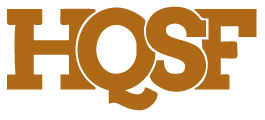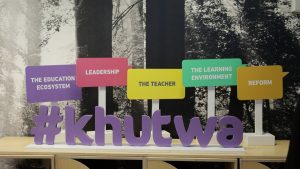Courtesy of Hani Qaddumi Scholarship Foundation (HQSF)
During the first four months of 2018, twenty-five Palestinian educators took part in a unique capacity-building program, Sparking Dialogue on Education (SDE), run by the Hani Qaddumi Scholarship Foundation as part of its initiative Khutwa* for Inspired Education in Palestine. The program took these educators – about half of whom were teachers – on a fascinating learning journey, starting with a week in Helsinki to get a firsthand look at the top-ranking Finnish education system, followed by a series of thematic workshops in Palestine that aimed to spark a true dialogue around what education should look like in today’s world.
The workshops were facilitated by Finnish experts in education, giving the participants a wealth of new ideas, approaches, techniques, and tools, as well as the opportunity to dialogue directly with one another and share best practices that already work in the Palestinian context.
SDE is a program that rides the cusp of the new global trend in education, aiming to give educators fresh perspectives on age-old questions and particularly to equip teachers to implement tangible changes within the classroom. Several months after the program’s end, the experience has indeed registered a positive ripple effect within the schools and learning environments of the participating teachers. Many of them report that they have changed their methods in the classroom to a more student-centered approach, with an emphasis on making the learning experience fun and engaging. For Hadeel Ahmad, an English teacher at Saint Joseph’s School, the program confirmed her own inclination that the traditional format of education, with the teacher delivering a lecture and students taking on a passive, receptive role, needs to change. “The curriculum can be a bit sterile, but there are many things that can bring joy and life back into the classroom,” she says. “I am trying to implement the techniques I saw in Finland and, to the extent possible, adapt the program to my own context.” This includes changing things in the classroom by taking the students outside, using technology to make learning fun, lightening the homework burden, and engaging the students in playtime as a way to learn. Hadeel sees these techniques, witnessed in the Finnish education system, as a way of putting joy back into the learning experience, a theme that many of the other participants echoed as well.
There is no doubt that on a global scale, we are witnessing a shift in education. The demands of the labor market are changing as new sectors emerge and others recede, creating the need for traditional skills, such as literacy and numeracy, to be complemented by soft skills and new competencies, such as creativity, communication, and critical thinking.
Increasing student-student interaction and collaboration was another common shift that teachers made following the program. “As a teacher in the classroom, I definitely changed my methods after participating in the program,” says Raeda Mansour, a science teacher and student affairs officer at the Arab Evangelical Episcopal School. “I now focus more on collaborative learning, which helps students take more responsibility not only for their own learning but also for that of their classmates.”
Increasing student autonomy and self-confidence by focusing on life skills as well as academics is another avenue of development mentioned by the teachers, who aim to help students become well-rounded and develop a genuine, lifelong love of learning. “As a teacher,” says English teacher Suheir Dumati, who works at the Qalqilya Basic Girls School – UNRWA, “I now give my students positive assessment which in turn instills in them trust and understanding, thereby motivating them to progress in their learning.”
“My colleagues were very interested in what I’d learned in Finland,” says Jamil Khalil, a physics teacher at the Orthodox School. So, Jamil shared what to him seemed like one of the hallmarks of the Finnish education system, namely the level of trust and autonomy that teachers enjoy. In practice, this means that teachers in Finland are not subject to inspections or assessments, an idea that Jamil shared with the administrative staff at his school. He hopes that this idea can offer a new perspective on the teaching profession and especially on admin-teacher relations. Freeing up teachers from the burden of inspection, Jamil adds, allows them to focus on teaching and affords them flexibility in terms of the curriculum.

More broadly speaking, SDE utilizes active dialogue as a way of working towards a common vision and breaking down the communication barriers between stakeholders. Many participating teachers carried this spirit forward in their interactions within their school ecosystems. “The program helped me start a dialogue with the school administration, faculty, and students,” explained Siryeh Fdeilat, an English teacher at Fawwar Basic Girls School No. 1 – UNRWA. Siryeh then developed a plan based on the results of the dialogue, starting with defining the values that her school is founded on. “I found that the most urgent need in school is to promote the values of trust, respect, and self-reliance among teachers and students. Values are the first step in the change process,” she added.
What about for teachers who are seasoned veterans? Could the program still have a positive impact on their teaching? Mohammad Shawamreh, a teacher with 21 years of experience, certainly believes so. Mohammad came into SDE already having developed many of his own innovative and engaging techniques to teach high school physics at the Arab Institute in Jerusalem. During SDE, his fellow participants were highly impressed and amused by the best practices he shared, such as setting the laws of physics to the tunes of popular songs to make them easier for students to memorize. For Mohammad, who has many responsibilities within his institution, Khutwa’s impact was most notable in terms of the workshops he delivers to other teachers at the school. “I realized that I needed to improve my structure and organization in delivering capacity-building workshops to my colleagues,” he explained, “and attending the Khutwa workshops gave me an amazing blueprint to do so.”
While Khutwa’s impact has certainly been felt in the classrooms, it has also, in many cases, extended to a larger circle of colleagues and administrators. Many report that other teachers and even principals were interested in hearing about education in Finland and the themes discussed in the workshops in Ramallah. A number of program participants set up their own special workshops to share the experience with their colleagues.
Indeed, this was the hope of the workshop facilitators: that the interactive delivery style would inspire participants as much as the content itself. Various engaging techniques were employed in the workshops – “food for thought” presentations to stimulate discussions, group work, digital tools such as kahoot.it, Seppo, Mentimeter, and others to model the positive use of technology in the classroom, as well as learning cafés,*1 gallery walks,*2 and many others. Participants came away with a wealth of new approaches to use in their own classrooms and presentations.
Reman Abu Leil, an English teacher from Jerusalem Basic Boys School – UNRWA, plans to implement some of these digital tools in her classroom this school year. “One of the digital techniques I want to use this year is the online game Seppo, which sends students outside the walls of the classroom on a ‘learning adventure’ in the local neighborhood. We played the game during the Khutwa workshops, and it was such a fun experience that I want to pass it on to my students.” Reman also struck up a new partnership with a provider of digital textbooks to introduce these books to classes at her school, thereby making learning more fun, interactive, and engaging, which she hopes will help students stay in school and complete their studies.
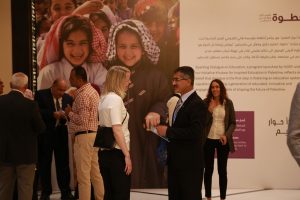
One of the SDE thematic workshops focused on the learning environment and how to create a space that is most conducive to learning. Several of the teachers who took part in the program are interested in making changes to their learning environments, away from the traditional idea of a classroom as simply a teacher, students, desks, and chairs, towards a new open classroom format that could include any number of elements such as a library, a stage for plays, and movable furniture. “I think that we need to update our definition of a learning environment in Palestine,” affirms Muneer Jawabreh, Khutwa participant and mathematics teacher at Arroub Basic Boys School No. 1 – UNRWA. Other teachers are taking better advantage of existing spaces within their schools, such as playgrounds and outdoor spaces, a common practice in Finnish schools. “I started taking my students to the playground for certain lessons,” says Suhaib Zeid, a science and tech teacher at Qalqilya Basic Boys School No. 1 – UNRWA, “and I realized that almost any lesson can benefit from time outdoors.” Carried along by the momentum for personal and professional development that he had gained through the program, Suhaib spent time this summer developing his skills further through online instructional and inspirational education sites, a true testament to the fact that teachers never really take time off.
In addition to practical tools and methods of teaching, many of the participants expressed a shift in mentality brought about by their experience in the program. “The program affected my entire way of thinking and approach to change,” confides Dania Samer, a physics teacher who also occupies the role of vice-principal for academic affairs at the Qimam Academy. Now, instead of seeing change as an overwhelming, complex matter that requires an enormous effort, Dania sees it simply as a matter of small steps that can be achieved with the right strategy. Putting this shift in mentality into action, Dania has helped start a Khutwa-inspired program at her school called Jusoor.*3 The program aims to involve teachers and staff in a dialogue process in order to foster collaboration based on shared values towards a common vision. Jusoor seeks to spread the ideas that Dania learned in Khutwa within her own school ecosystem, which includes 70 teachers and 1,200 students, through a series of ongoing workshops.
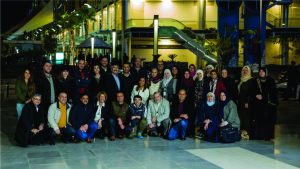
Moreover, SDE has piqued teachers’ interest in educational models and best practices from other countries, and shown how educators can adapt them to the Palestinian context. As the teachers begin to implement tangible changes in their teaching styles, attitudes, and learning environments, many of them expressed the need for continued support in order for these changes to have a sustainable impact. This support comes from school administrative staff and parents, as well as the Khutwa organization itself. Some teachers cited the need for financial support for certain projects, whereas others want to see a change in attitude among the general public towards the teaching profession, in order to foster a culture that highly values and respects teachers.
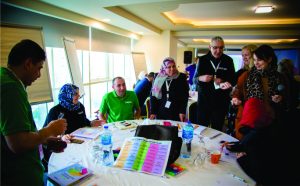
One thing is clear, programs such as Khutwa’s Sparking Dialogue on Education can have a ripple effect throughout the education ecosystem. “Khutwa gave me the inspiration to take the first step towards positive change,” says Naela Haj Hussein, a computer and tech teacher and deputy school principal at Askar Basic Girls School No. 3 – UNRWA. “Children are a nation’s greatest wealth and resource, which is what pushes me to carry forward this journey of change that Khutwa set in motion.”
Hani Qaddumi Scholarship Foundation (HQSF) came to life in 2000, stemming from the Qaddumi family’s belief in the transformative power of education. Initially dedicated to increasing access to education, it has granted scholarships to 1,302 bright, talented Palestinian youth over the past 18 years. As a result, 548 scholars have graduated and are actively contributing to prosperity in Palestine. Inspired by its alumni success, HQSF evolved into Khutwa, an organization with a broader scope and a more holistic approach. Today, through building effective networks and increasing access to new opportunities, Khutwa will serve as a powerful catalyst for youth empowerment.
More information on Khutwa initiative can be found at http://khutwa-hqsf.org/; information on the HQSF can be found on Facebook (@HQSFoundation), Twitter (https://twitter.com/HQSFPalestine), LinkedIn (https://www.linkedin.com/company/hani-qaddumi-scholarship-foundation/), and YouTube (Hani Qaddumi Scholarship Foundation (HQSF)). You can contact HQSF via e-mail at info@hq-sf.org or by phone at +962 6 581 6819.
* Khutwa is the Arabic word for step, and refers to HQSF’s initiative Khutwa for Inspired Education in Palestine.
Article photos courtesy of HQSF.
*1 Learning café: a method for sharing and discussing ideas where several stations are set up, each with a group of participants. The facilitator gives a question or discussion topic, and each group takes some time to share amongst themselves about the topic. After a specified amount of time, the facilitator gives a signal, and one participant remains at the station while the rest move on to a different one. The participant who remains at the station explains to the newcomers what was discussed previously, and then they build further on those ideas. The process is repeated several times, and key ideas and messages are written on a flipchart for final sharing among all participants. Learning café is an easy-to-use method of creating powerful collaborative dialogue around significant questions.
*2 Gallery walk: a way of showcasing and sharing individual work within a group. Each person hangs her/his work on a wall or display area, then other people in the group walk through and read each display; those who like a specific work can sign their names to it or add a sticker or post-it. To read about other techniques used during the workshops, read the full program report at http://khutwa-hqsf.org/uploads/HQSF_Report.pdf.
*3 Jusoor means bridges in English.

